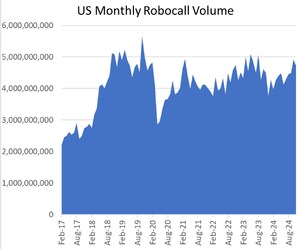Americans Hit by Just Under 46 Billion Robocalls in 2020, Says YouMail Robocall Index
Annual Robocall Volumes Declined 22% from 2019 During COVID-19 Pandemic
IRVINE, Calif., Jan. 26, 2021 /PRNewswire/ -- U.S. robocalls declined under the lockdowns of COVID-19, with an estimated 45.9 billion robocalls nationwide in 2020, marking an almost 22% decrease from the 58.5 billion robocalls recorded in 2019. This total is roughly 4% below the 47.8 billion robocalls received in 2018, yet still over 50% higher than the 30.5 billion robocalls in 2017.
On a monthly basis, February 2020 was the highest volume month of the year, at just over 4.8 billion calls, far below the all-time peak of just under 5.7 billion robocalls in October 2019. When the pandemic hit hard in April 2020, just two months later, we saw the lowest month at just under 2.9 billion robocalls, a massive drop in short order. However, robocalls started increasing again after that, finishing the year by bouncing around the 4 billion calls/month level.
"We've once again had over 100 billion robocalls over the past two years combined," said YouMail CEO Alex Quilici. "While the pandemic helped reduced robocall volumes materially, we're still at levels that were considered outrageous a few years ago."
Several key learnings from 2020 include:
- Even a pandemic cannot make the robocall problem disappear. While robocalls dipped to 2020's lowest levels in April, that was still higher than June 2018, barely two years earlier, and still consisted of between 50%-60% spam and telemarketing calls.
- Enforcement actions help, but they are not a silver bullet. Even pre-pandemic, the tide was turning, with robocalls down roughly 15% from their peak in February vs. October. Well-publicized FCC, DOJ, and state Attorneys General actions against Health Insurance robo callers and carriers that supported fraudulent callers do appear to have made a difference in stopping hundreds of millions of robocalls from being made.
Scam Calls Remain at High Levels
Even with a dramatically reduced volume of robocalls in 2020, there were over 20 billion scam calls during the year and another 6 billion telemarketing calls, together totaling just under 60% of all robocalls.
Type of Robocall |
Estimated 2020 Robocalls |
Percentage 2020 Robocalls |
Change from 2019 |
Scams |
20.6 billion |
46% (+2) |
-20% |
Alerts and Reminders |
11.6 billion |
26% (+4) |
-14% |
Financial Reminders |
7.5 billion |
16% (-5) |
-34% |
Telemarketing |
5.9 billion |
13% (-1) |
-27% |
Despite these large numbers, individual consumers had a very different view of the robocall problem depending on the states where they resided.
The Robocall-A-Day Club
Perhaps the best measure of the pain of robocalls is how many each person gets on average. Last year the only locale that got more than one robocall per day was Washington D.C., whose residents got an estimated 423 robocalls per person, which works out to roughly 1.2 per day. Two other states got more than 5 per week: Louisiana at 262, and South Carolina at 260. On the other side of the scale, residents of Alaska got 39 per year, which is significantly less than 1 per week.
State |
Robocalls Per Person |
|
Washington DC |
423 |
|
Louisiana |
262 |
|
South Carolina |
260 |
|
Alabama |
252 |
|
Nevada, Tennessee |
244 |
|
Georgia |
235 |
|
Arkansas |
215 |
|
North Carolina |
209 |
|
Florida |
197 |
|
Delaware |
188 |
|
Texas |
163 |
|
Virginia |
162 |
|
Wyoming |
158 |
|
Utah |
153 |
|
Mississippi, Oklahoma |
146 |
|
Ohio |
145 |
|
Arizona, Connecticut |
140 |
|
Kentucky |
134 |
|
Colorado |
127 |
|
Montana |
126 |
|
Michigan |
122 |
|
Missouri |
119 |
|
Maryland |
117 |
|
New Jersey |
112 |
|
Pennsylvania |
106 |
|
Idaho |
105 |
|
Indiana |
102 |
|
New Hampshire |
101 |
|
Hawaii, Illinois |
98 |
|
New York |
97 |
|
South Dakota, California, Rhode Island |
96 |
|
Nebraska |
95 |
|
Kansas |
92 |
|
North Dakota |
87 |
|
Washington |
85 |
|
New Mexico |
84 |
|
Iowa |
83 |
|
Oregon |
82 |
|
Maine |
81 |
|
Wisconsin |
74 |
|
West Virginia, Vermont |
73 |
|
Minnesota |
60 |
|
Massachusetts |
59 |
|
Alaska |
39 |
|
The Two Billion Robocall Club
Only five states got more than 2 billion robocalls during the year compared with eight states last year. The number of robocalls a state got was generally tied to the state's population – the larger the population, the more robocalls. The top state, Texas, was the only state to get more than 5 billion robocalls, with California 2nd with roughly 4.5 billion calls; Florida 3rd with 3.75 billion robocalls; Georgia 4th with just under 3 billion robocalls; and New York 5th with just over 2.5 billion calls. All states saw a decline, with the biggest declines of 29% in Louisiana and Mississippi, and the smallest declines of 13% in Alaska, Arizona, South Caroline, and Vermont.
State |
Robocalls Received |
Change |
|
Texas |
5.19 Billion |
-22% |
|
4.51 Billion |
-25% |
||
3.75 Billion |
-15% |
||
2.97 Billion |
-17% |
||
2.56 Billion |
-27% |
||
1.80 Billion |
-19% |
||
1.77 Billion |
-15% |
||
1.63 Billion |
-23% |
||
1.61 Billion |
-22% |
||
1.46 Billion |
-15% |
||
1.21 Billion |
-23% |
||
1.19 Billion |
-25% |
||
1.18 Billion |
-29% |
||
1.15 Billion |
-26% |
||
1.12 Billion |
-19% |
||
1.04 Billion |
-13% |
||
.99 Billion |
-13% |
||
.97 Billion |
-27% |
||
.73 Billion |
-14% |
||
.69 Billion |
-25% |
||
.63 Billion |
-27% |
||
.58 Billion |
-16% |
||
.54 Billion |
-14% |
||
.54 Billion |
-23% |
||
.50 Billion |
-25% |
||
.49 Billion |
-20% |
||
.48 Billion |
-23% |
||
.47 Billion |
-27% |
||
.42 Billion |
-29% |
||
.42 Billion |
-19% |
||
.40 Billion |
-22% |
||
.34 Billion |
-21% |
||
.33 Billion |
-23% |
||
.25 Billion |
-23% |
||
.24 Billion |
-17% |
||
.19 Billion |
-17% |
||
.19 Billion |
-26% |
||
.16 Billion |
-24% |
||
.15 Billion |
-22% |
||
.13 Billion |
-22% |
||
.12 Billion |
-16% |
||
.12 Billion |
-21% |
||
.11 Billion |
-14% |
||
.10 Billion |
-18% |
||
.10 Billion |
-24% |
||
.09 Billion |
-14% |
||
.07 Billion |
-19% |
||
.06 Billion |
-27% |
||
.04 Billion |
-13% |
||
.02 Billion |
-13% |
||
Where These Robocall Estimates Come From
These data are provided by YouMail, a free robocall blocking app for mobile phones. YouMail recently won the American Business Awards' Gold Stevie Award for Technical Innovation of the Year, and the YouMail app was named the nation's best robocall-blocking solution in a competition organized by Geoffrey Fowler of the Washington Post.
YouMail blocks unwanted robocallers by making sure the user's phone doesn't ring, and then plays an out-of-service message that leads them to think they dialed an invalid number. YouMail identifies problematic numbers and robocalls using a combination of its recently patented audio fingerprinting technology, call patterns, and consumer feedback.
YouMail provides the YouMail Robocall Index to estimate robocall volume across the country and for specific area codes every month. This estimate is formed by extrapolating from the behavior of the billions of calls YouMail has handled for its users, and these statistics are regularly cited by the FCC as a definitive source for national data trends.
For a full ranking of cities, states and area codes, as well as details on the behavior of robocallers in each area code, please see http://robocallindex.com. To listen to actual voice messages left by robocallers, please visit the YouMail Directory. To join the YouMail Robocall Index mailing list, please write to [email protected].
About YouMail, Inc.
YouMail, Inc. provides security-first, cloud-based communication services for mobile phones. YouMail's free app-based service uses sophisticated, patented technology to block robocalls and phishing messages, protecting users from spam, identity theft, stalkers, and corporate fraud. Our premium call management services provide virtual receptionist and virtual number services, and they are designed for people who use their mobile phone for business. These services help them unify virtual numbers with their cell number, handle high volumes of mobile calls, and provide personalized answering experiences for their callers. YouMail's communications platform handles over a billion calls per year for over 10 million users, and our users range from everyday consumers to sole proprietors to the CEOs of the largest companies in America. The YouMail Robocall Index™, since its launch in in September 2015, has emerged as the nation's definitive source on robocalling data for telecom carriers, smartphone and app companies, and public policymakers. YouMail, Inc. is privately funded and based in Irvine, California.
Contact:
Rohan Notaney for YouMail
Lumina Communications
[email protected]
650-814-9651
SOURCE YouMail Inc.

WANT YOUR COMPANY'S NEWS FEATURED ON PRNEWSWIRE.COM?
Newsrooms &
Influencers
Digital Media
Outlets
Journalists
Opted In





Share this article